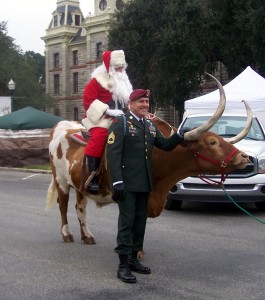
That’s pretty much what it turned out to be over Friday evening in South Texas. When my daughter returned from briskly walking the dogs before dawn Saturday morning, she told me that the grass crackled underfoot. We set out for Goliad just after sunrise, expecting to spend a chilly day selling books in the open-air. Well, the pavilions set up around the edge of Courthouse Square in Goliad were all essentially in the open-air too. We took along our heaviest coats, extra blankets, bundled Nemo in a doggy overcoat, and I made a vain search for my gloves.
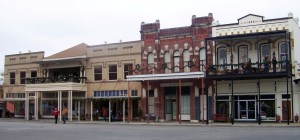
To our good fortune and relief, Estelle Zermeno, who has set up Miss Ruby’s Author Corral ever since I’ve been coming to Goliad for the Christmas event, had located an last-minute indoor venue for us – the premises of a closed restaurant, right on the square; a restored historic building with a bathroom, parking around in back and heat. Alas, that was about the last good bit of news about the day. Two scheduled authors had called off appearing, due to the cold and potentially dangerous drive, so it was down to four authors and a handful of friends.
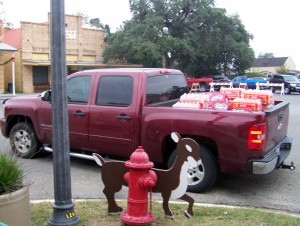
We had shelter at least, but the other vendors were out in the miserable cold – and to add to the misery, there were very few people come out to shop or cheer for Santa. On the good side of that, I got a very good picture of Santa-onna-longhorn, and his military escort, but there seemed to be only about two dozen children and their parents, where ordinarily there would have been hundreds. No posse of cowboys escorting Santa, hardly anyone with a Christmas-dressed dog for the afternoon dog costume contest. I believe I only had four or five potential customers come and look at my books all day.
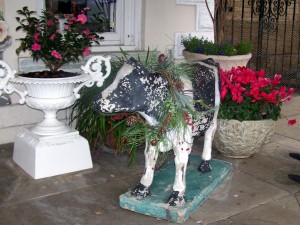
We packed it up by 1:30, when a light drizzle began falling, and it was so cold that we were afraid it would turn to ice, somewhere along the road back to San Antonio. I am certain that if we had been outside as well, we wouldn’t have stood it for even that long. There were just no customers at all; this marks the very first time that I came away from an event like this without having made a single sale – and I don’t think I was the only one, not by a long shot.
Three Gentlemen Adventurers – 1
“It feels good to have General Sam back in the governor’s chair,” Jack Hays remarked, in a rare moment of political frankness, as he and Jim took their leisure at one of the many cantinas along the main plaza in the heart of old San Antonio de Bexar. In the cool of the evening, there were tables and benches under the shade of trees outside, where men could sit and drink, and observe the passing world, as the western sky went from a cloud-streaked orange and purple to velvet-darkness, spangled with stars. “He might be a cagy, close-mouthed old ruffian, but I always thought that I could trust him, ‘cause he knew what he was doing. With Lamar, I was always a little worried that he was making it up as he went along.”
“Gen’ral Sam is all for annexation,” Jim mused. “But Lamar always thought we could go it alone. If those Yankees didn’t want us, then why not go it alone? I favored him on that account.”
“Leave it to the General,” Jack Hays advised. His eyes went across the darkening plaza, still filled with people, lit by lanterns and the warm candle-light shining out from windows and doors, and by old-fashioned torches in iron holders. Several Indian women sat on a blanket opposite, an array of finely-worked baskets laid out for display. Toby hunkered on his heels, talking to them; they were laughing at what he was saying, although an older and grey-haired woman looked upon him with some severity. “The ladies’ delight of the Delaware nation,” Jack added with wry affection. “I shall regret it very much when he – or you marry, although I would wish you well in that. There are things that I can only send a single young fellow to do.”
“Speaking of which,” Jim hinted broadly and Jack grinned. “No long journey involved in this one. This matter is centered right here in Bexar.” “Do tell,” Jim settled back into his chair, prepared to be – if not amused, at least intrigued. Jack continued, “You’ve been in and out of Bexar plenty of times; did you ever notice the old Casa Wilkinson? It’s down Soledad beyond the Veramendi Palace.”
“Tall stone wall, topped with broken bottle glass, a garden behind and barred windows that look like they haven’t been opened since I was in small-clothes?” Jim ventured.
Jack nodded. “That would be the one – it’s was closed up when the old General died. His heirs have squabbled over the property for twenty years since. None of them wanted to come out to the back of nowhere – but by god, they didn’t want anyone else to have it. I’ve always wondered why Wilkinson ventured out here, anyway. He was getting up there in age, by then. Guess he figured that he had double-crossed so many people in his lifetime he’d best have a nice out-of-the way burrow to lay low in.”
“That General Wilkinson?” Jim asked, astonished. “Who fought under Washington against Gentleman Johnny Burgoyne and then tried to set Gates and Washington against each other? Took against Mad Anthony Wayne after the Cross-Timbers fight… informed on Aaron Burr after being in league with him? My own father always said that Wilkinson was as slippery as a greased snake, and so crooked that he couldn’t walk down the street without meeting himself on the other side coming the opposite way.”
“That same General Wilkinson, yes,” Jack agreed, with a glint of good humor in his eye. “Who was altogether too friendly with the Spanish governor of New Orleans; it’s whispered that he likely was in the pay of the Spanish at the time. Maybe the British as well, just for good measure. He wanted a land grant in Texas for himself – went to Mexico City to get it, and died there, twenty years ago and a bit. But he had this house here – lived in it for a time. His man of business bought it for him, back in the earlies.”
“So, why is this matter and man a concern at this moment – since he has been dead nearly as long as either of us have been alive, and Texas no longer a Spanish possession?” Jim asked. Yes, he had to hand it to Jack – he did come up with some interesting conundrums. Or missions, as he liked to call them.
“There’s something about that house,” Jack answered. “Or maybe in the house … suddenly, upon the estate finally being settled for good and all, a lot of interesting – and interested – foreigners are coming to Bexar – all with innocent expressions on their faces and asking urgent questions regarding – about the freehold, the cost of purchasing it for owners unknown, the condition of the house and outbuildings. Likely we’ll see some of them tonight, and I’ll point them out to you. You know, if you sat here long enough, you’d see everyone that you know in the world pass by … and by jingo, there goes the first of them.” Jack jerked his chin in the direction of burly, blunt-featured man walking purposefully towards a temporary stage lit by many lanterns erected against the wall of the Council House, attended by three or four men and as many women, all seeming to vie for his attention. The quiet gravity of his haberdashery was rather spoiled by a flamboyant waist-coat and brilliantly colored neck-cloth.
“English, by the look of his suit,” Jim ventured and Jack nodded. “Name is Bernard Vibart-Jones. His ostensible purpose in coming here is to give dramatic and comic recitations, which he has been doing to standing crowds for the last week or so. I’ll have to admit – he’s very good at that. He’ll have the hair standing up on the back of your neck and the next minute, rolling on the floor laughing. He’s a hail-fellow-well-met, and very popular, seemingly. Spends evenings after his performances in the taps and taverns, buying drinks for all and encouraging people to tell him their stories. He is … rather cagy about how long his engagement here will last, though.” Jack’s gaze sharpened, upon noting another young man, very young and dressed in the sober clothes of a clerk or even an apprentice lawyer. He had been sitting at a table set outside the door of another drinking establishment, farther along the plaza; alone and toying in a desultory manner with a neglected tankard. Without any impression of fuss or hurry, he tossed some coins on the tabletop, and sauntered off towards the crowd gathering at the open-air stage. Obviously he intended to be among the amused or hair-raised audience. “What do you think, Jim?”
“Yankee … not rich, not poor either. One of those milk-water professions,” Jim added, serenely unaffected by the awareness that he had himself been one of those milk-water clerks not so long past. “Hasn’t been here long enough – or agreeable enough to settle in. No weapons on him that I can see. Come here to do business his employer’s bidding, not set a course of his own.”
“Very good, Jim,” Jack allowed a brief and amused expression to reveal itself. “Albert Biddle, of Hartford, Connecticut. He is a clerk – or apprentice lawyer in a firm established in that fair city. He at least has the virtue of being straight-forward in his reason for coming here. The person for whom he acts – officially nameless – wants to purchase the Casa Wilkinson for eccentric reasons of their own. Master Biddle is merely their errand-boy … or so is the pretense.”
“And?” Jim asked, for Jack appeared to be ironical in that regard.
“He’s just too un-subservient for an errand-boy,” Jack answered, as Albert Biddle wended a purposeful way towards the Council House. “I am in luck tonight – and so are you, for there goes the third of our mysterious trio of foreigners with an interest in the Casa Wilkinson – also looking for entertainment this lovely evening.”
“Looks like a Mex.” Jim observed as soon as he picked out the man whom Jack meant; this one a casual loafer among those promenading along the edges of the Plaza on this evening. The Mexican women who tended their kettles of red-bean, beef and chili-pepper stew all called to him invitingly, but he shook his head and walked on. This man was even more elegantly-clad than the Englishman, although all in faultlessly-tailored black, and he carried a cane. His features gave the lie to the elegance of his attire, and Jim thought that in rougher clothing and less careful barbering, this last man wouldn’t have looked out of place in a Ranger company. “A rough customer, I’d say – looking beyond the haberdashery.”
“Spanish. An all-wool and yard-wide proper Spanish grandee,” Jack answered with a glint of amusement. “Don Esteban Saldivar, Caballero de Tarragona. I have no idea what part of Spain that is in. But he presented his papers and some very imposing letters of reference … and he also has an interest in the Casa Wilkinson. He has even taken a set of rooms in the residencia which backs onto a portion of the Casa. By curious coincidence, there are whispers in that quarter of town that the Casa is now haunted. Mysterious lights seen flickering behind shuttered windows, noises and the sounds of footsteps, so on and so forth.”
“How long has that been going on?” Jim bit back his own amusement. There were so many stories circulating in the Mexican quarter of Bexar about ghosts, visions and odd creatures seen from the corner of an eye. Not even the Anglos could be entirely skeptical.
“There were always stories about the Casa,” Jack answered. “But they have taken on a new urgency in the last fortnight or so. I’m tasking you with finding out what our three gentlemen are looking for.”
“And taking it from them?” Jim didn’t like the sound of that at all. Jack smiled.
“Maybe. Whatever the old General hid there is at least thirty years old. The chances of it proving embarrassing to a living soul here in Texas are likely pretty small … at the very least, make certain they don’t run across each others’ trap-lines and cause trouble for General Sam with their governments. Use your own good judgment, you and Toby. Just get these three gentlemen out of here without messing up General Sam’s campaign for annexation.”
“I think I’ll begin by sending Toby to scout the Casa, while the three gentlemen are otherwise occupied,” Jim decided at once and Jack nodded in agreement. “And then see if I can scrape some acquaintance with them, one by one.”
“You’d best hurry,” Jack added with a grin. “Vibart-Jones starts his performance in ten minutes.” A quick consultation with Toby, who quickly rose at Jim’s approach, and they each set off in on their separate scouts; Toby to the maze of alleys and tall windowless walls which had accreted on and around Soledad as a particular sea-snail gathered ornaments to its shell, and Jim to the stage and the crowd gathering in similar but human fashion to the stage set against the blank wall of the Council House. Jim marveled – and not for the first time – how varied was any ordinary crowd of citizens of Bexar; rough-clad Texians like himself, elbow to elbow with soberly-dressed Yankee merchants, flamboyant Bejarenos in black trimmed with silver buttons and lace, with vivid silk sashes around their waists, their ladies in brilliantly-colored silk skirts and chemise bodices which showed off their shoulders and arms, Indians of every tribe and degree of undress, and buckskin-clad hunters spitting tobacco juice onto the dusty ground. A pale cloud of cigarillo and pipe smoke hovered over the gathering, for many of the ladies smoked as well … a crowd in any other place must be a dull and pallid gathering by comparison. Edging with casual care among the others, Jim stood elbow to elbow with Albert Biddle as the evening performance opened.
Vibart-Jones was introduced with much fulsome praise and assurance that he had performed before the varied crowned heads of Europe by an older man in a rakish suit and a lamentable waistcoat, at such length that the part of the crowd most fluent in English began to shift and mutter, while the impatient to cat-call and jeer. “I expect him to be the performing marvel of the age, if the least part of this is true. Allow me to introduce myself – James Reade, Esquire – of this town.” Jim ventured to Biddle, who rose at the bait and introduced himself, much to Jim’s gratification
“He treads the boards very fairly – and I have certainly seen worse where I come from. Albert Biddle – also Esquire. I believe, good sir, we practice the same vocation.”
“Thought you sounded like an easterner,” Jim hoped he wasn’t overdoing it. “So you have seen the bard of the Plaza del Armas before?”
“Last night,” Biddle admitted, with a touch of wry humor, “For the oldest city in Texas there is not all that much to do … and it’s too cold to swim in the river, which is what I am told is a primary diversion on summer evenings here.”
“So what brings you here?” Jim hoped that he was not overdoing the appearance of casual innocence, but on observing a sudden glint of sharp intelligence in Mr. Biddle’s eye, be feared that he had. To save the moment, the compere gave way to the chief performer of the evening; Bernard Vibart-Jones stepped to the front of the stage, where a series of oil lanterns cast back their focused reflections on him. The actor bowed graciously to a patter of applause and cheers. In a pleasant light baritone, he complimented the audience and the folk of Bexar on the very warm welcome that he had received, and Mr. Biddle lowered his voice. “Mr. Reade, I believe we also practice the very same avocation – that of finding the answers to puzzles or missing items, to the benefit of the nations to which we owe allegiance.”
Damn the man – he was more than a simple clerk. Jim found his composure and his voice. “What gave me away?” he asked, and Biddle grinned. “Your answer just now. I only ventured a guess – but then I saw you in very earnest conversation with Captain Hays not ten minutes ago – and if he is not your republic’s spymaster, he makes an excellent pretense. I have seen the performance before – Mr. Reade, let us walk around the square together. I will tell you what I know – and of what Captain Hays has no doubt guessed in the matter of Wilkinson and his long-forgotten property here.”
(to be continued … of course.)
It’s been a strange week, all in all – for a number of different reasons, several of which brought me around to thinking of my father. There is a lot of Dad in the character of Vati, in the Adelsverein Trilogy – the free-thinking, scientific interests, and how he pushed all of us to excel, although not the absent-mindedness, and gnome-like appearance. Physically, Dad looked actually rather like Papa, in Daughter of Texas/Deep in the Heart – tall and fair, with broad shoulders, rather like the actor Vince Morrow in his prime. Dad passed away on the day after Christmas, 2010, a week short of his 80th birthday. Between one week and the next he was fine, and then suddenly semi-paralyzed, and in the hospital, being operated on for a subdural hematoma. Between the next week and the week after he was recovering … and then not doing so well – that he was in a comas, but only temporary. On Christmas Eve, everyone assured us Dad was fine; the problem would be sorted out soon … but on the day after Christmas, my brother called, and said there was nothing that they could do. Last Rites had been performed, although Dad always insisted that he was an agnostic. I have wondered since if the hospital staff kept Dad going in life-support just to get through Christmas Day. There was an episode of the TV show M*A*S*H with just that very plot.
More »
Scott Cooley, who lived for revenge on those who had a part in the murder of his foster-father, Tim Williamson, made a kind of headquarters with his violent and disreputable friends in Loyal Valley. George Gladden had a place there – he, like many other participants in the feud – was a small rancher with a reputation as being handy with a gun. A few weeks after the murder of Deputy Whorle, Cooley’s gang targeted Peter Bader, who was reported to have been in the lynch mob who ambushed Tim Williamson on the road between the Lehmburg ranch and Mason, and had fired the final shot killing Tim Williamson. Unfortunately, Cooley and Johnny Ringo hit Peter Bader’s brother Carl, instead – gunning him down in his own field where he had been working. Whether this was deliberate or a case of mistaken identity is a matter undecided – but by committing this murder, Cooley had thrown a rock into a hornets’ nest. The Clark faction responded by attempting to draw out the Cooley gang to Mason. Sheriff Clark convinced – or hired – a local gambler named Jim Cheney to try and talk the Cooley gang into coming to Mason.
Cheney was only able to find George Gladden and Mose Baird; whatever he said to them convinced them to set out on the road between Loyal Valley and Mason. The two of them had just reached John Keller’s general store on the river-crossing just east of Mason – and there they spotted Sheriff Clark waiting, just outside the store. Clark’s men opened fire on the two from behind a stone wall. Both of them badly wounded, they still managed to escape a little way up the road, with the ambushers in hot pursuit. But Mose Baird died of his wounds and Peter Bader – whose brother had been murdered by Cooley and Johnny Ringo – wanted to finish off George Gladden. John Keller, the storekeeper, refused to countenance this, and store he’d kill anyone who’d shoot the wounded man. Peter Bader contented himself by merely cutting a gold ring from the hand of the dead Mose Baird. Perhaps this brief incident best illuminates the bitterness of the Hoodoo war; that some men on either side fully embraced savagery, while others drew back, horrified.
By late September, the situation had degenerated to the point where a company of Rangers was dispatched to Mason, under the command of Major John B. Jones, to restore order. By that time, there was none to speak of in Mason County. Sheriff Clark and a good number of his allies had forted up in Keller’s store, after rumors that Cooley’s band was intent on burning out the German settlers of Mason. Cooley and his band were already in Mason, too. They had tried to intimidate an Irish storekeeper, David Doole, into helping him. Armed with a shotgun, Doole refused; he was on good terms with many of the local Germans. Rebuffed, Cooley and his friends holed up a short distance down the street in Tom Gamel’s saloon on the west side of town – that Tom Gamel, who had been part of that first rustler-hunting posse early in the year, and who had broken with Clark and recruited friends of his own. In the meantime, Johnny Ringo and another of Cooley’s band paid a visit on Jim Cheney, who had led George Gladden and Mose Baird into the ambush at Keller’s store. Cheney invited them to share breakfast with him, apparently certain that his part in the matter wasn’t known. Johnny Ringo shot him down.
Gunfire also erupted in the streets of Mason: Dan Hoerster, the elected brands inspector, his brother-in-law, and third man were shot at, while riding down Main Street towards Gamel’s saloon, although they had been warned of the presence of the Cooley gang. Dan Hoerster fell, and the other two took refuge in the local hotel and fired back, to the horror of guests. Major Jones and his Ranger company arrived in the aftermath of this latest outrage, and began searching for Cooley and his friends. The major had his own problems; he had no cooperation from either side, with Anglo against German, each convinced that he was sympathetic to the other side. Worse still, a number of his own Rangers were former comrades of Scott Cooley – and finally the major called them to order and issued an ultimatum. Any who couldn’t find it in themselves to hunt for Cooley would be granted an honorable discharge from service. Three of the Rangers accepted the offer. The hunt for Cooley and the others continued – and in December, Cooley and Johnny Ringo were taken captive by the sheriff of neighboring Burnet County. Hearing that friends of theirs might break them out of the Burnet County Jail, the sheriff wisely sent them to custody in another and more secure jurisdiction.
With the apprehension of Cooley, the violence tapered off, although there was one last vengeance murder; that of Peter Bader. He had been hiding out in Llano County, but early in January of 1876, George Gladden and John Baird ambushed him on the road between Llano and Castell. With grim satisfaction, John Baird cut his brother Mose’s gold ring off Peter Bader’s hand.
By the end of that year, the Hoodoo War was over, save in memories and nightmares for those who had participated in it or were merely witnesses. Those participants with the bloodiest hands found it expedient to leave Mason County for good. Sherriff Clark, indicted on charges of complicity in the disappearance of suspected Cooley gang members, resigned his position after the charges were dropped and vanished without a trace. Johnny Ringo, charged and acquitted in the murder of Jim Cheney, and John Baird also both departed at speed, and turned up in New Mexico, where they both came to violent and unhappy ends. Scott Cooley, who had suffered a mysterious and chronic illness which medical authorities of the time called ‘brain fever’ died very suddenly from a bout of it, in the fall of that year. The only man convicted by a court of law in any of the Hoodoo War murders was George Gladden, sentenced to prison for the murder of Peter Bader.
And there it all ended, although many prominent and otherwise respectable men had doubtless been part of the masked lynch mobs. The Mason County courthouse burned, early in 1877, destroying just about all the written records associated with the feud. A long-time Mason resident and descendent of early settlers told me that upon the burning of all the records, the city fathers decided mutually to draw a line under the whole matter and call it a day. I am fairly certain, though – that no rustler or honest rancher – took a casual attitude towards absconding with Mason County cattle for a long time afterwards.
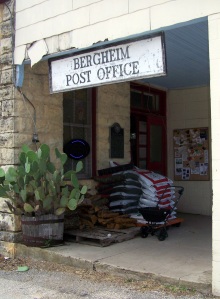 Visiting the Bergheim General Store and Post Office is a bit like going back in time to what a general mercantile over a hundred years ago. The Bergheim General Store is itself 109 years old; it stocks a a little bit of everything, and everything in it’s place on densely-packed on the shelves. The aisles are narrow, much of the place is erratically lit — in places with neon beer signs. No where is there any shred of conventional 20th century marketing wisdom … nor does there need to be, as there doesn’t seem to be any other retail outlet for ten or fifteen miles in any direction save for the gas station quickie-mart about a block away. So it is the best source for catfish bait, a couple of potatoes, soft drinks, jeans, work cloves, odd bits of hardware, cured sausage, vegetable seeds, a quart of milk and a pair of pliers for all those people who don’t want to drive to Boerne or Bulverde for it. Four generations of the same family have been running the place since 1903, so it’s pretty safe to say that they know what they are doing. Aside from having electricity and air conditioning introduced sometime in the last 109 years, the inside is pretty much as it was when built: plain narrow-board floors, plain whitewashed/painted stone walls. It’s a trip back in time – and I found it very useful in visualing the various general stores that the Becker and Richter families started at the end of the Civil War. And there will be more in the next book, too – about Magda and Hansi’s commercial ventures. I don’t know when I’ll have The Quivera Trail done, but it’s up to eight chapters this week.
Visiting the Bergheim General Store and Post Office is a bit like going back in time to what a general mercantile over a hundred years ago. The Bergheim General Store is itself 109 years old; it stocks a a little bit of everything, and everything in it’s place on densely-packed on the shelves. The aisles are narrow, much of the place is erratically lit — in places with neon beer signs. No where is there any shred of conventional 20th century marketing wisdom … nor does there need to be, as there doesn’t seem to be any other retail outlet for ten or fifteen miles in any direction save for the gas station quickie-mart about a block away. So it is the best source for catfish bait, a couple of potatoes, soft drinks, jeans, work cloves, odd bits of hardware, cured sausage, vegetable seeds, a quart of milk and a pair of pliers for all those people who don’t want to drive to Boerne or Bulverde for it. Four generations of the same family have been running the place since 1903, so it’s pretty safe to say that they know what they are doing. Aside from having electricity and air conditioning introduced sometime in the last 109 years, the inside is pretty much as it was when built: plain narrow-board floors, plain whitewashed/painted stone walls. It’s a trip back in time – and I found it very useful in visualing the various general stores that the Becker and Richter families started at the end of the Civil War. And there will be more in the next book, too – about Magda and Hansi’s commercial ventures. I don’t know when I’ll have The Quivera Trail done, but it’s up to eight chapters this week.

Recent Comments